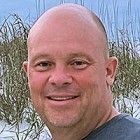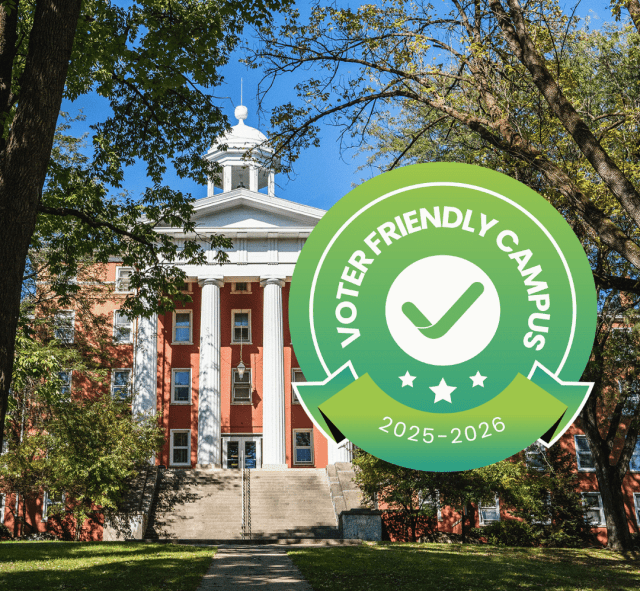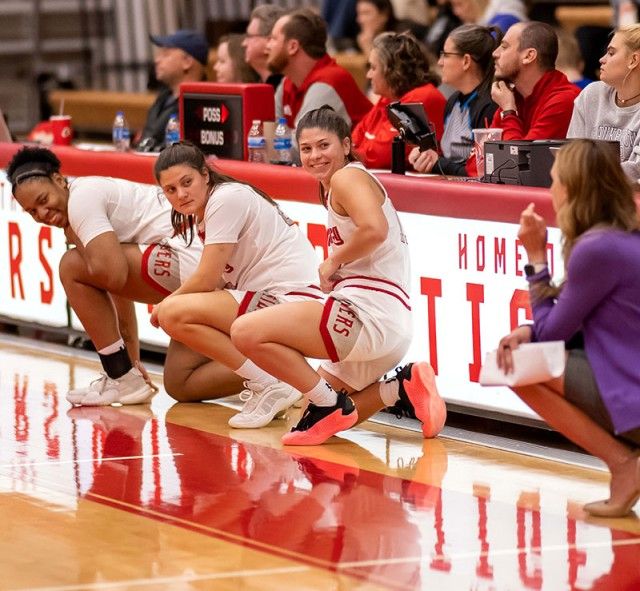Occasionally dodging raindrops that failed to dampen anyone's spirit, Wittenberg University's Class of 2009 basked in the glow of a traditional outdoor graduation ceremony in picturesque Commencement Hollow on Saturday, May 16.
University President Mark H. Erickson led a celebration of the 420 members of the Class of 2009, who were honored at Wittenberg's 164th annual Commencement exercises. He paid tribute to the graduates, noting the extraordinary accomplishments of some and the exceptional journeys of others. He also welcomed four distinguished guests in attendance, the 2009 Commencement speaker, TIME Magazine editor Richard Stengel, Bishop Mark S. Hanson, presiding bishop of Evangelical Lutheran Church in America (ELCA), The Rev. Canon Dr. Michael Bourdeaux, founder of the Keston Institute, and David E. Behring, president of the Wheelchair Foundation, each of whom were awarded doctors of humane letters.
The Class of 2009 included 20 "non-traditional" students from Wittenberg's School of Community Education, undergraduate students from 27 different states, the District of Columbia and seven countries outside of the United States. Undergraduate degrees of Bachelor of Arts, Bachelor of Science and Bachelor of Music were awarded, in addition to two Master of Arts in Education degrees. Degrees were granted in 29 different majors, spanning the alphabet from art to theatre and dance.
A total of 124 graduates earned Latin honors in recognition of their exceptional academic pursuits. Fifty-seven of them were designated cum laude (3.5-3.69 grade point average), 29 magna cum laude (3.7-3.79) and 38 summa cum laude (3.8-4.0). Among the latter group, two students - Dan Marous from Bexley, Ohio, and Andrea Ipjian from Paradise Valley, Ariz. - achieved a perfect 4.0 grade point average during their collegiate careers.
Erickson, Wittenberg's 13th president, pointed out that Commencement is just the start of the Wittenberg journey. He saluted the members of the Class of 2009 for their activism and dedication while undergraduates on campus, and he encouraged them to remain connected to their alma mater, no matter where life's journey takes them in the future.
"This is not just a four-year experience," Erickson said. "Once you come to Wittenberg, you are part of Wittenberg, and Wittenberg is part of you for a lifetime.
"That is part of what makes this place so special. As I have traveled the country and the world this year talking to Wittenberg graduates, they all talk about their continuing engagement with Wittenberg - about staying in touch with their classmates and professors, and maybe even the college president."
Erickson also noted a special bond he shares with the Class of 2009.
"The Class of 2009 is the class that came to Wittenberg the same summer that I did," Erickson said. "We learned the campus together and have grown together during the past four years.
"I will not graduate today, but you will always be 'my' class. As such I feel particularly connected to this group of seniors."
Class President Andrew Tomko from North Olmsted, Ohio, used his time at the podium to discuss life lessons learned during his four years at Wittenberg. He referenced the "family" atmosphere that prevails at Wittenberg, and he lauded the academic challenges that prepared him well for professional success in the future.
"By working and studying with various friends, I was consistently challenged to move my standards to a higher level," said Tomko, a political science major who intends to pursue a career in the legal profession. "This was something that I was familiar with in high school football, working harder to improve and earn more playing time. At Wittenberg, though, the challenges came inside the classroom from my fellow classmates.
"No longer was I focused on just obtaining a superb grade – instead, I wanted to compete and learn as much as I could embrace. What I have learned is how powerful and beneficial education can be when students work to help one another and further their individual perspective."
The 16th managing editor in the history of TIME since its founding in 1923, Stengel oversees the award-winning newsmagazine with 25 million readers worldwide, as well as TIME.com, which draws 6 million unique visitors a month. In addition, Stengel, a 1977 magna cum laude graduate of Princeton University and author of several books, including a collaborative work with Nelson Mandela, also manages TIME's other brand extensions, TIME Style & Design and TIME For Kids, and is a frequent television commentator on CNN and MSNBC.
After saluting the graduates, he offered nine ("because nine is a more interesting number than 10") rules of life, beginning with "Do not follow your bliss" and concluding with some light-hearted advice.
"Spring for that one expensive, quality suit, instead of buying the two cheap ones that are on sale," Stengel said. "It will serve you better in the long run."
Hanson has served as an advocate for social justice throughout his nearly 40 years in the ministry, including the last eight years as the presiding bishop of the Evangelical Lutheran Church of America. He concurrently serves as president of the Lutheran World Federation, and he is a member of the executive council of the National Council of Churches USA.
Formerly the president and CEO of Great Bear Construction, president of the Seattle Seahawks, executive vice president of Blackhawk Corporation and president of the Blackhawk Automotive Museum, a Smithsonian affiliate, Behring has advanced his father's vision for the Wheelchair Foundation since taking the helm in 2003. To date, more than 748,000 wheelchairs have been delivered to children, teens and adults who need one but cannot afford one in more than 140 countries.
Bourdeaux has promoted religious rights for people of all faith traditions and served as an advocate for those suffering persecution for their faith. In 1969, Bourdeaux founded the Centre for the Study of Religion and Communism, now known as the Keston Institute, which collects and preserves documentation of religious suppression, and supports research by scholars and human rights activists about the conditions of persecution.







